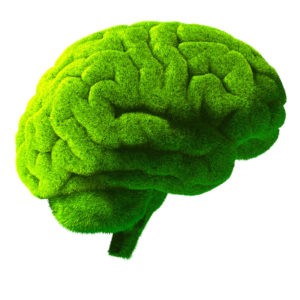Food Determines Mood

Story by Ann E. Butenas
What you eat can affect your mental health, as research suggests a connection between mental illness and nutrition.
 Mental illness is something that affects millions of Americans. According to NAMI, the National Alliance on Mental Health, one in five adults experience some sort of mental illness and roughly one in 25 American adults deal with a serious mental illness. Further, NAMI has indicated that about one-half of all chronic mental illness issues begins at the age of 14, with three-quarters by the age of 24. Depression takes the lead as being recognized as the leading cause of disability around the world. From a financial standpoint, serious mental illness costs America $193.2 billion in lost earnings every year. The statistics continue and present a rather disheartening story.
Mental illness is something that affects millions of Americans. According to NAMI, the National Alliance on Mental Health, one in five adults experience some sort of mental illness and roughly one in 25 American adults deal with a serious mental illness. Further, NAMI has indicated that about one-half of all chronic mental illness issues begins at the age of 14, with three-quarters by the age of 24. Depression takes the lead as being recognized as the leading cause of disability around the world. From a financial standpoint, serious mental illness costs America $193.2 billion in lost earnings every year. The statistics continue and present a rather disheartening story.
However, did you know that the simple act of incorporating proper nutrition into your diet can have a direct correlation on the improvement of mental health? This is where the “you are what you eat” mentality somewhat comes into play. In fact, according to Drew Ramsey, Assistant Clinical Professor of Psychiatry at Columbia University, “one of the most powerful interventions a therapist can have on a client is diet.” In other words, there is evidence that what you eat and the condition of your mental state of mind are related.
If you want to improve your mental health and emotional well-being, look at what you put on your plate. Food plays a highly integral role between your mind and your digestive system. For example, bad eating and drinking habits can negatively impact your actions and thoughts. Indulgence and poor eating habits can lead to poor reasoning. When you tax your digestive system, it compromises your mental capacity.
As such, it is important to focus on a diet rich in vegetables and fruit. These inspire feelings of well-being. Conversely, if your diet is mainly comprised of fast food and junk food, you are more likely to experience physical health issues and adversely affect the way you think and feel. (Have you ever noticed that when you eat a cheeseburger and fries you may initially feel good, but then later you feel a bit down and underwhelmed? The same goes for a healthy snack, such as fruit or some carrot sticks. When you eat these, your mind makes you feel happy, as you know you are doing something good for your body. In other words, your mind associates good food choices with feeling good, especially when you know what you are eating is good for you, in mind, body, and spirit. Your mind will sympathize with what you put into your stomach. When you overeat, your mind can become cloudy and foggy, perhaps even irritable and forgetful. Therefore, it is important to maintain a healthy gut to keep your mind equally healthy.
We get it. It can be easy to forget what we are eating and not recognize the impact it has on our feelings and emotions. However, proper nutrition is vital for our nervous system to run at an optimum level.
 There is such a strong connection between what we eat and mental health issues, such as depression and anxiety. While some studies indicate depression is caused by a chemical imbalance in the brain, it can also be caused by improper nutrition. Think about it: common depression symptoms can include loss of appetite or over-indulging, as well as poor eating habits. These unhealthy habits not only lead to depression but can further exacerbate it. So, the solution lies within that understanding. Change what you eat.
There is such a strong connection between what we eat and mental health issues, such as depression and anxiety. While some studies indicate depression is caused by a chemical imbalance in the brain, it can also be caused by improper nutrition. Think about it: common depression symptoms can include loss of appetite or over-indulging, as well as poor eating habits. These unhealthy habits not only lead to depression but can further exacerbate it. So, the solution lies within that understanding. Change what you eat.
Based on studies conducted in multiple countries within Asia and America, there is a suggested link between nutritional deficiency and many mental health disorders. The most common types of which include anxiety, depression, bipolar disorder, obsessive-compulsive disorder, schizophrenia, and ADD/ADHD. These disorders have been linked to certain nutritional deficiencies. For those in the studies who had these disorders, they showed a lack in vitamins, minerals, and omega-3 fatty acids.
Omega-3 fatty acids deserve a closer look, too. These contain anti-inflammatory properties and play a significant role in brain development and function. When one is deficient in this essential nutrient, it can be linked to mental health issues. Further, while supplements can help reduce symptoms of the aforementioned disorders, the focus should remain more on a diet that has ample fruits and vegetables. However, if the deficiency in nutrients is quite serious, then a diet providing a combination of both supplements and food to assist in building back up your efficiency should be strongly considered.
 Amino acids are important, too. These are found in such foods as quinoa, eggs, turkey, cottage cheese, mushrooms, fish, beans, and legumes converted to neurotransmitters. These neurotransmitters then go to work alleviating symptoms of mental illness. There are six neurotransmitters, all of which play a particular role in various body functions, such as digestion, memory, sleeping, eating, and even mood regulation. When you are lacking in certain amino acids, certain mental health disorders can arise. For example, a low serotonin level has been linked to suicide. It is vitally important to supply your body with the amino acids it requires, as the body does not produce these on its own. Some of the most common signs of low serotonin levels are anxiety, depression, nervousness, OCD, chronic increase in pain, headaches, aggression, and insomnia. Among the many sources you can find serotonin include cucumbers, potatoes, walnuts, leafy greens, soy, and seaweed.
Amino acids are important, too. These are found in such foods as quinoa, eggs, turkey, cottage cheese, mushrooms, fish, beans, and legumes converted to neurotransmitters. These neurotransmitters then go to work alleviating symptoms of mental illness. There are six neurotransmitters, all of which play a particular role in various body functions, such as digestion, memory, sleeping, eating, and even mood regulation. When you are lacking in certain amino acids, certain mental health disorders can arise. For example, a low serotonin level has been linked to suicide. It is vitally important to supply your body with the amino acids it requires, as the body does not produce these on its own. Some of the most common signs of low serotonin levels are anxiety, depression, nervousness, OCD, chronic increase in pain, headaches, aggression, and insomnia. Among the many sources you can find serotonin include cucumbers, potatoes, walnuts, leafy greens, soy, and seaweed.
Small changes in your diet can make a significant difference. It’s worth a try, isn’t it? After all, good food can easily translate to a good mood. That sounds like a pretty tasty outcome.






